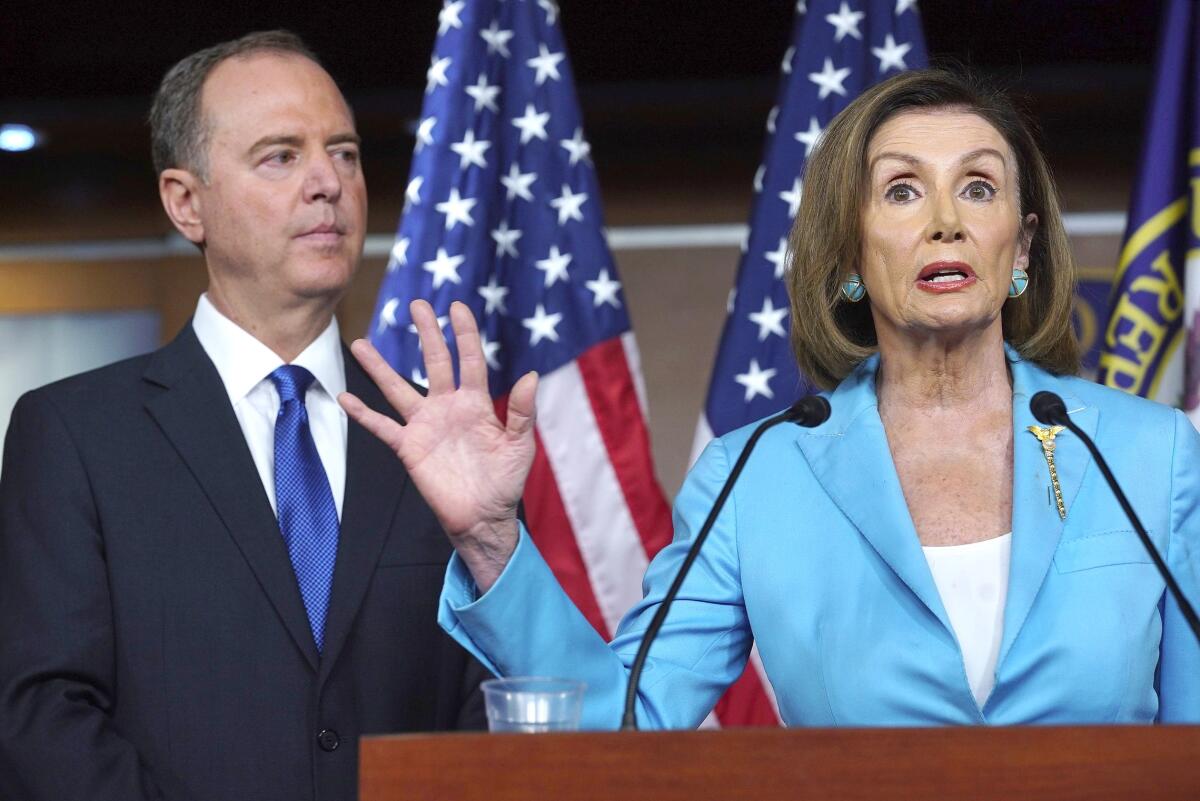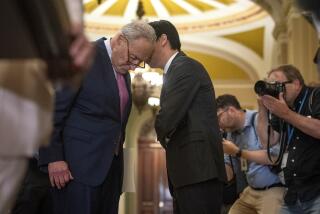Pelosi considers, then rejects holding a House vote on impeachment inquiry — for now

WASHINGTON — Amid growing political pressure from Republicans, House leaders on Tuesday began seriously gauging support among Democrats for holding a vote to formally establish the impeachment investigation of President Trump — even through the inquiry is already underway.
But by the end of the day and after pushback from members during a closed-door meeting in the basement of the Capitol, Speaker Nancy Pelosi (D-San Francisco) decided there would be no House vote for now, reaffirming her previous stance on the issue.
“At this time, we will not be having a vote,” she said.
Her announcement came as more top White House officials, including Vice President Mike Pence and Energy Secretary Rick Perry, announced their intentions to defy House subpoenas, and others in the State Department continued to provide information in the investigation, putting more cracks in the White House’s attempt to build a wall of resistance.
One of those State Department officials, George Kent, told House investigators Tuesday that the White House moved quickly after recalling former U.S. Ambassador to Ukraine Marie Yovanovitch on May 20, putting Ukraine policy into the hands of three people — who later called themselves “the three amigos” and were viewed as more sympathetic to the president — according to Rep. Gerald E. Connolly (D-Va.), who was in the room for Kent’s deposition.
Kent, the deputy assistant secretary of State responsible for Ukraine, said that in a May 23 meeting organized by acting White House Chief of Staff Mick Mulvaney, it was determined that U.S. foreign policy on Ukraine would be led by U.S. special envoy to Ukraine Kurt Volker, U.S. Ambassador to the European Union Gordon Sondland and Energy Secretary Perry, Connolly said.
Ukrainian President Volodymyr Zelensky was informed of the arrangement in an early June meeting in Kyiv — a proclamation that stunned some in the U.S. Embassy, Connolly said. Kent, meanwhile, was instructed to “lay low” and defer to the others in the following weeks, according to Connolly.
On July 25, Trump — who at the time was withholding about $400 million in aid to Ukraine — asked Zelensky to investigate former Vice President Joe Biden on unfounded allegations. Disclosure of that conversation triggered the current the House impeachment inquiry. Volker, who has since quit his position, has already offered his deposition to House investigators, and Sondland is scheduled to meet with them Thursday.
Though Pelosi had previously expressed little interest in holding a vote on an impeachment inquiry, Democratic leaders on Tuesday began consulting with members in moderate or pro-Trump districts to gauge their appetite for holding a formal vote, which could be uncomfortable for some. While Congress has been out of session for the last two weeks, polls show public support for the impeachment inquiry has risen. So there was some hope that a vote might be easier for some.
But several lawmakers remained opposed to a vote, saying they did not want to appear to be bowing to GOP pressure or concede to the argument that without a vote the inquiry is not legitimate.
Rep. Norma Torres (D-Pomona) said Trump cannot be allowed to dictate the terms of the impeachment process. “He is not in a position to demand anything,” she said. “The only position that he’s in should be to give us all the information that we’re requesting.”
Pelosi announced three weeks ago that Democrats would begin a formal inquiry, a move that doesn’t require a vote on the House floor, though one was held during the Nixon and Clinton impeachment inquiries.
Democrats have faced pressure from Republicans to hold the House floor vote, arguing that no lawmaker should escape the political ramifications of such a consequential vote.
Holding a vote would undercut a key GOP talking point against the inquiry — that Democrats are conducting a sham, partisan inquiry that gives Republicans little right to participate.
White House officials specifically cited the lack of a House vote in their letter declaring that they wouldn’t participate in the inquiry. But even with a vote, few expect the White House would then cooperate.
Republicans may hope that a formal resolution will include language giving them more powers to participate in the inquiry, such as subpoenaing their own witnesses. But it’s unclear what any resolution might say and it’s doubtful that Democrats would cede such power to the minority party.
“There’s no requirement that there be a floor vote,” Pelosi said earlier this month when asked why the House wouldn’t hold the vote. “That’s not anything that is excluded and, by the way, there’s some Republicans that are very nervous about our bringing that vote to the floor.”
The vote would be politically contentious for a handful of moderates in both parties. But Republicans may have more at stake. Only eight Democrats have not publicly supported an impeachment inquiry. All of them represent districts that Trump won — and five of them are districts where Trump won substantially, by more than 10 percentage points.
Several other moderate Democrats saw little public backlash for their inquiry support during the recess. In fact, Rep. Max Rose (D-N.Y.) was applauded at a town hall meeting this month when he announced his support for an inquiry for the first time.
But while a vote would force those moderate Democrats to pick a side, it would force Republicans to do so as well. GOP lawmakers, who have overwhelmingly stuck with Trump through the House’s impeachment investigation, would have to decide whether the president’s actions warrant an inquiry.
A vote would come as the House’s investigation is already in process. Four former or current administration officials have already testified behind closed doors. And more officials are expected for the rest of the week.
That’s despite the White House refusal to participate. Energy Secretary Perry said Tuesday that he would abide by the White House’s noncompliance policy as he faces a deadline of Friday to comply with a subpoena to turn over documents. “We will address it as the White House deems appropriate,” he said.
Pence and the Office of Management and Budget signaled similar intentions to defy House subpoenas.
On Tuesday, lawmakers questioned Kent, the deputy assistant secretary of State responsible for Ukraine, about Rudolph W. Giuliani’s work in his role as the president’s personal lawyer to push Ukraine’s government to open an investigation of Biden and his son Hunter and to persuade Trump to recall Yovanovitch from her post in Kyiv.
Kent, still a State Department employee, was instructed by the White House not to appear, but ultimately showed up after the House Intelligence Committee issued a subpoena.
Giuliani, himself currently under investigation by prosecutors in New York, made it clear Tuesday he has no intention of complying with Democratic subpoenas.
Up against Tuesday’s deadline for turning over documents to House investigators, Giuliani sent a letter through his attorney, Jon Sale, stating that he “will not participate because this appears to be an unconstitutional, baseless, and illegitimate ‘impeachment inquiry.’”
The letter also stated that Giuliani “adopts all the positions set forth” in an eight-page letter last week from White House Counsel Pat Cipollone, which summarized a number of political arguments against the impeachment inquiry but relied little on legal precedent.
Democrats have stated that such noncompliance with their investigation would be viewed as obstruction.
Times staff writer Eli Stokols contributed to this report.
More to Read
Get the L.A. Times Politics newsletter
Deeply reported insights into legislation, politics and policy from Sacramento, Washington and beyond. In your inbox three times per week.
You may occasionally receive promotional content from the Los Angeles Times.












